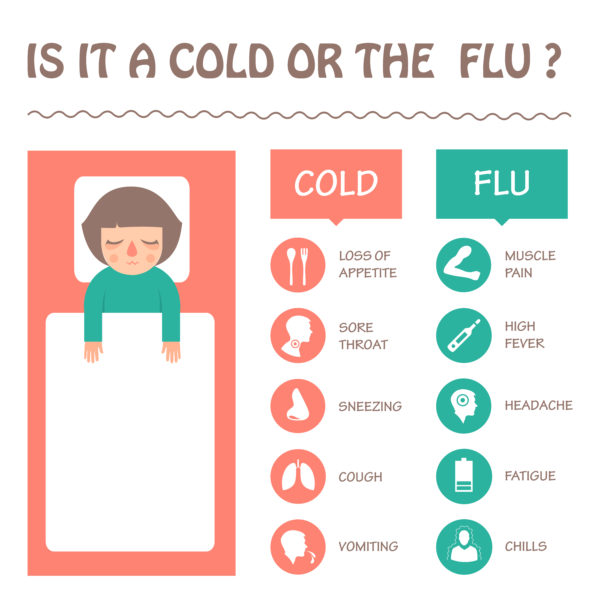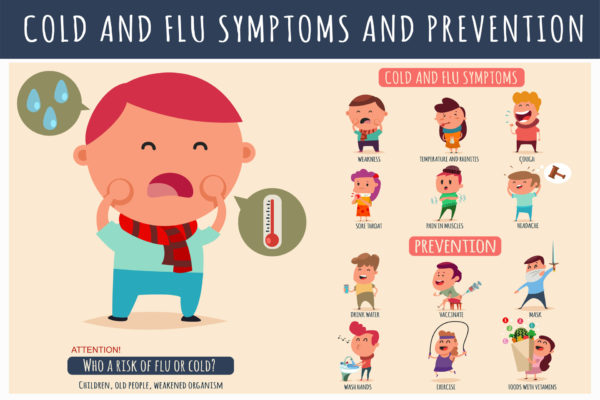Flu is an infection caused due to an influenza virus that effects upper respiratory system, lungs, throat and even other parts of the body. Many people get infected by it every year during winter months. Flu symptoms can be severe, and life-threatening especially in children, elderly and immunocompromised.
The most critical thing is to be able to recognise the early symptoms of flu and prevent it from getting complicated or spread. The first sign of flu can be easily missed as they are usually mistaken for the symptoms of the common cold. So you need to be extra careful.
First Signs Of Flu
- Nose Congestion or Stuffy Nose– If runny and stuffy nose accompanies body ache, fever, and loss of energy it may be a sign of flu.
- A Sore Throat- In the common cold, there is a sore throat, and post nasal drip that may slowly cause swelling of your glands. But in case of flu first, the throat becomes little scratchy, then quickly there is throat irritation, and swallowing becomes hard.
- High fever- In most of the cases, flu comes with a fever. You may have flu even without a fever, but if there is fever, it is usually high around or above 100 degrees Fahrenheit.
- Unbearable Bodyache – There may be little achiness in common cold, but if along with a cough and congestion there is severe body ache as if you have been hitten you need to see a doctor. Also, many flu patients complain of body ache with chills.
- Overwhelming Fatigue– Flu makes you feel so weak and tired that even walking around becomes difficult, but in the common cold, you can walk.
- Cough Fits Causing relentlessness- There is ticking in your throat making you cough up a storm to clear the mucus blocking your airways. Not everyone with flu will show this symptom but if it is present along with high fever and overwhelming fatigue you need to see your doctor.
How To Differentiate Flu Symptoms 2018 With Symptoms Of Common Cold
The most significant difference between a common cold and the symptoms of flu is that the flu symptoms sneak up on you whereas the progress of common cold is slow. In common cold, you are little sick one day; symptoms are little worse the other day and the 3rd day the sickness is full-blown. But in Flu you are fine one day, and the other day you are very ill.
Symptoms of flu vary from one person to other. There may also be diarrhoea and vomiting in children and adults.
Flu Symptoms In Kids
It doesn’t matter how healthy and fit your child is, flu can affect anyone. In children, it may not be easy to tell that your child has flu. Symptoms are intense and come fast in comparison to the common cold. During the first three days, the flu symptoms in kids is worse.
The symptoms include:
- High fever up to 104 degrees along with chills
- Extreme tiredness
- Bodyache
- A headache
- A hacking and dry cough
- A sore throat
- Vomiting
- Belly pain and sometimes diarrhoea
Due to nausea, pain in abdomen, vomiting and diarrhea the flu symptoms in kids may be confused with the stomach bug.
How Flu Spreads
Flu is highly contagious. It spreads through sneezing, coughing and even sharing foods, drinks and other objects that get infected on coming in contact with nose or mouth of the infected person. One day before the symptoms start individual becomes contagious and remains contagious 5-7 days even after sickness. Children may be contagious for even more than seven days after becoming sick.
What Is The Treatment Of Flu
In most of the cases, flu gets better in less than two weeks. Antibiotics are of no use unless there is a secondary bacterial infection. Self-medicate yourself by taking proper rest and not going out to work and take lots of fluid.
Refrain yourself from taking aspirin or giving aspirin to your child as it may cause Reye syndrome. If you or your child in on specific medication for example medication for asthma, diabetes or epilepsy do not discontinue it.
When To Seek Doctor’s Help
Some people especially children, elderly, people with certain chronic diseases and pregnant females develop complications and may require immediate hospitalisation. Occasionally flu may become life-threatening and lead to death.
In case of children contact your doctor immediately if:
- The child has flu and is less than 12 months old.
- Drinking less fluid or child refuse to drink.
- Severely irritated and do not want to be held
- In 24 hours a child has passed urine less than four times.
- The child seems to improve and suddenly becomes worse or if the child doesn’t seem to improve.
- The child is less than two years and was born prematurely.
- Was hospitalised within last three months
- Has chronic disease such as cystic fibrosis, asthma heart diseases, diabetes, etc.
- The child is on an organ transplant.
*Even if you are a healthy adult getting over flu and you feel better for a day, and then symptoms are worse the other day see a doctor as it is indicative of secondary infection.
Signs Of Emergency : When To Dial for Help
- Severe difficulty in breathing
- Lips and tongue turn blue
- Episodes of stopping or irregular breathing
- The worrying rash is not going away on pressing
- The patient is unconscious and doesn’t wake up properly.
- Serious confusion and dizziness
- Severe vomiting
Tamiflu: Side Effects Of Tamiflu
The prescription medicine used to treat flu in children two weeks of age, and an elderly having symptoms of flu for not more than 48 hours is Tamiflu.
Tamiflu use is controversial. Some doctors say that there is very little evidence where Tamiflu has reduces the severe complications of flu.
How Effective Is Tamiflu
Patients who take Tamiflu within two days of getting sick and are positive to flu test in comparison to flu patient who hasn’t taken it recovers one day faster.
Tamiflu is also used as preventive medicine and can reduce the chance of getting flu in older and children below one year of age. However, do not consider the drug a substitute for the yearly flu vaccine. Getting flu shot is the best way to protect yourself the entire season.
Also, Tamiflu is not the medicine to prevent bacterial infections that happens along with flu.
Common Side Effects Of Tamiflu
- Nausea
- Vomiting
- Diarrhea
- Stomach pains
- Headaches
- Dizziness
Serious side effects of Tamiflu is rare but occurs more often in children. If your child is taking Tamiflu then immediately discontinue and speak to your doctor if you see following symptoms.
Serious Tamiflu Side Effects In Kids
- Seizures
- Hallucinations
- Sudden confusion
- Delirium
- Unusual behaviour
- Self-injury
Also, stop Tamiflu if there is an allergic reaction, hives, breathing difficulty, swelling of tongue lips and throat and skin rashes and immediately seek medical attention.
The use of Tamiflu is approved in case of adults, children or 2 weeks young. But still, we recommend consulting your doctor before taking it.
If you are pregnant or nursing female, immunocompromised, have a breathing problem or heart issue Tamiflu may not be suitable for you, so let your doctor know about it.
Tamiflu does not work for a patient who is more than 65 years old. Also, it is not recommended for people with the end-stage renal disease who are not receiving dialysis.
If you are allergic to oseltamivir or any other ingredient of Tamiflu, do not take it.
How To Prevent Flu
Flu vaccine offers the best protection against influenza. The flu vaccine can be received by injection and shot. After vaccination, it takes about two weeks for the antibodies to develop and provide protection. Better get vaccinated before flu season begins that is by the end of October. If you forget to get vaccinated before the beginning of flu season get vaccinated later. Flu vaccine still can be beneficial throughout flu season even during January or later months in preventing flu or reducing the severity of illness.
The flu vaccine does not guarantee 100 percent prevention. To reduce the risk of catching flu follow specific rules during influenza outbreak:
- Wash your hands at regular intervals
- Keep surfaces and platforms clean
- Cover your nose and mouth while sneezing or coughing
- Make sure to throw the tissue in the dustbin
- Maintain a distance from those who are sick
- According to a recent study done by University of Maryland School of Public Health, an infected person produces tiny droplets filled with an infectious virus that remains in the air for a long time. Thus an infected person can even spread flu virus just by breathing near someone else. If you are sick, do not go out to work and do not send your kid to school or daycare if he/she is unwell.
2018 flu season seems to be the worst in years. It has turned fierce and deadly. Thousands of Americans are sick, baffling with mucus and fighting fever sweats. Finally, flu season 2018 may be levelling off still a lot of new flu cases are emerging out there. Flu symptoms 2018 is expected to last for several more weeks so better stay at home if you are sick, get vaccinated if you haven’t already and wear a breathing mask when out especially in crowdy places.












